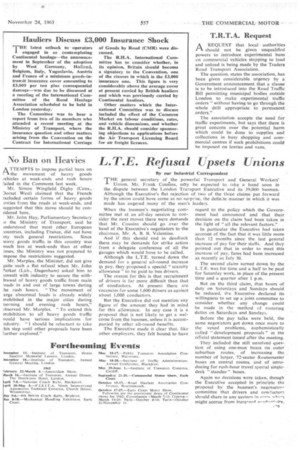L.T.E. Refusal Upsets Unions
Page 31

If you've noticed an error in this article please click here to report it so we can fix it.
By our Industrial Correspondent
THE general secretary of the powerful Transport and General Workers' -IUnion, Mr. Frank Couiins, ray be expected t&. take a hand soon in the dispute between the London Transport Executive and its 39,000 busmen. Although the Executive's flat rejection of two of the three claims put forward by the union could have come as no surprise, the defin:te manner in which it was made has angered many of the men's leaders.
When the .busmen's negotiating committee met at an all-day session to consider the next moves there were deniands that Mr. Cousins should go over the head of the Executive's negotiators to the chairman, Mr. A. B. 13. Valentine.
And if this should end in deadlock there may be demands for strike action from a delegate conference of all the garages which would have to be called.
• Although the L.T.E. turned down the demand for a general all-round increase ip pay, they proposed a special " scarcity allowance" to he paid to bus drivers. The reason for this is that recruitment of drivers is far more difficult than that of conductors. At present there are vacancies for some 1.600 drivers as against about 1,000 conductors.
But the Executive did not mention any figure of the amount they had in mind For this allowance. In any case it is a proposal that is not likely to get a welcome from the busmen, unless it is accompanied by other all-round benefits.
The Executive made it clear that, like other employers, they felt bound to have regard to the policy which the Government had announced and that their decision on the claim had been taken in the light of "all the relevant factors?'
In particular the Executive had taken account of the fact that it was little more than 12 months since the last general increase of pay for their staffs. And they pointed out that in order to meet this increase of pay, fares had been increased as recently as July 30.
The second claim turned down by the L.T.E. was for time and a half to be paid for Saturday work, in place of the present time and a quarter after 1 p.m.
But on the third claim, that hours of duty on Saturdays and Sundays should be reduced, the Executive declared its willingness to set up a joint committee to consider whether any change could be made in the method of rostering duties on Saturdays and Sundays.
Before the pay talks were held, the same negotiators got down once more to the vexed problems, euphemistically called "development proposals" in the official statement issued after the meeting.
They included the still unsolved question of using one-man buses on outer suburban routes, of increasing the number of larger, 72-seater Routernaster buses on central routes, and of introducing for rush-hour travel special singledeck "standee" buses.
Again no decisions were taken, though the Executive accepted in principle the proposal by the busmen's negotratirr, committee that drivers and conducton should share in any savinPs n r!"^*,'
might accrue from incre-ser1




















































































































